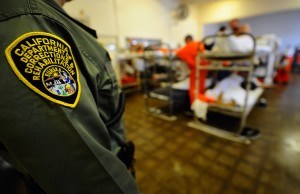This isn't the only recent setback for Brown on prisons. A federal judge on April 5 rejected Brown's bid to regain state control of inmates' mental health care, citing systematic failures to reduce prison suicides, provide timely care and hire enough staff.
Read the Associated Press report by Tom Verdin below.
SACRAMENTO, Calif. (AP) — A federal judicial panel on Thursday denied Gov. Jerry Brown's request to lift a court-ordered prison population cap and threatened him and other state officials with contempt of court if they fail to comply.
The ruling by the three-judge panel singled out the Democratic governor for ignoring its earlier orders to reduce the state's inmate population to the level ordered by the federal courts. Judges have said that capping the population is the most important step the state can take to improve inmate medical and mental health care.
In January, the governor sought to end the long-running court oversight of California's prison system and promised to take his fight again to the U.S. Supreme Court if necessary. At the time, he decried the billions of dollars California is spending to improve inmate medical and mental health care, saying the court had ordered the state to create "gold plate" prisons that were siphoning money from public schools, colleges, social services and other programs.
The judicial panel was unmoved.
Naming Brown, it said state officials must take whatever steps are necessary to comply with the court's inmate-reduction order by the end of this year or face the consequences.
Otherwise, "they will without further delay be subject to findings of contempt, individually and collectively. We make this observation reluctantly, but with determination that defendants will not be allowed to continue to violate the requirements of the Constitution of the United States."
The governor's office did not immediately respond to requests for comment, but corrections department spokeswoman Deborah Hoffman said the administration will appeal.
In an emailed statement, Hoffman said the quality of medical care delivered to California's prison inmates "far exceeds" the requirements of the Constitution. Any further steps to reduce the inmate population would jeopardize public safety, she said.
Thursday's ruling in favor of the inmates' attorneys was expected and is the latest development in two partially consolidated legal cases that date back several years.
One case, filed in 1990, concerns the treatment of mentally inmates. The other, filed in 2001, concerns substandard medical care. In both cases, the federal courts have ruled that the care provided by California's prison system was so poor it violated inmates' constitutional rights against cruel and unusual punishment.
Just last week, one of the judges on the panel rejected Brown's attempt to end the lawsuit over mental health care.
In both cases, the courts have appointed federal overseers to run those aspects of the prison system. The state has responded by building new medical and mental health facilities and hiring hundreds of new employees, many at salaries that exceed $200,000 a year.
Brown's boldest response has been his so-called prison realignment plan, which took effect in October 2011 and is sending thousands of lower-level offenders to county jails instead of state prisons.
That law alone has reduced the prison population by nearly 25,000 inmates, but it is still not enough to comply with the court order. The state still needs to reduce its inmate population by roughly 9,000 more inmates in its 33 adult prisons by the end of the year.
In January, the state said it had done enough, and Brown said the only way it could meet the court's population cap was to release dangerous felons.
The judicial panel acknowledged that Brown's realignment law had made headway, but also said the state had taken no further actions to comply with the court's directive.
It called the state's long-range prison blueprint "a plan for noncompliance" by allowing the state to house 9,000 more inmates than the court order allows.
"What further steps they will take in order to comply is equally clear: None," the judges wrote.
While their decision against the state was widely anticipated, the judges' ruling was somewhat remarkable in its singling out of the governor. It noted the U.S. Supreme Court's 2011 ruling that upheld the court-ordered population cap and emphasized that Brown has a duty to make any changes necessary and to do so promptly.
"Specifically, the rule is applicable to Governor Brown, as well as the lowliest citizen," the judges said. "That Governor Brown may believe, contrary to the evidence before this Court, that 'prison crowding (is) no longer . . . inhibit(ing) the delivery of timely and effective health services to inmates,' will not constitute an excuse for his failure to comply with the orders of this Court."
